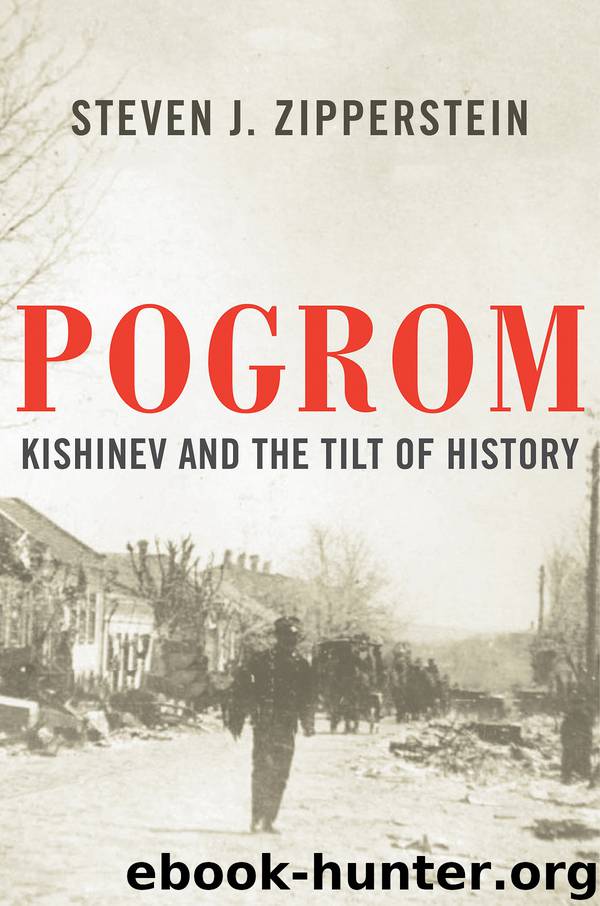Pogrom by Steven J. Zipperstein

Author:Steven J. Zipperstein
Language: eng
Format: epub
Publisher: Liveright
Davitt knew, of course, of efforts of Jews to resist; he described the fight waged by those in the wine courtyard. Yet nowhere in his dispatches or his book did he mention the confessions made by Jewish men in his hotel room. The nearest he came is the observation in the book of how striking it was that the mayhem was caused by rioters numbering no more than two thousand—his initial estimate was revised considerably after further research—in a city with tens of thousands of Jews. “Ninety percent of [the Jews] hid themselves or fled to safer parts in and out of the city for refuge.” He then let the statement stand without further comment.68
It seems likely that both Davitt and Bialik recorded what was then common knowledge and also just the sort of indelicacy that tends to fall between the cracks, especially when a beleaguered people like Jews are its target. Davitt’s decision, apparently, was to excise or at least disguise mention of it, whereas Bialik built the accusation into the very core of his poem. Like Davitt, so Dubnow, too: Neither in his memoirs, in which he devotes considerable attention to the pogrom, nor in his historical work on the subject does he allude to this charge despite a lengthy description of his collaboration with Bialik and his great admiration for “In the City of Killing.”
Bialik may well have felt that introducing this accusation—part and parcel of talk among Jews at the time—into an imaginative work was an act less overtly provocative than including it in a journalistic or historical account. Bialik understood that his poem would be read alongside the cascade of pogrom reportage still being produced at the time of the poem’s appearance, since trials of the accused continued well into December 1903. But already by then an essentially canonized version of the massacre had consolidated for Jews across the political spectrum, the bulk of liberals and radicals in Russia, and their sympathizers abroad. In such accounts, news of Kishinev’s wealthy Jews and their rush to safety or, for that matter, the role played either by Krushevan or by local seminarians in fanning the pogrom’s flames was sidelined or entirely dismissed. This was consistent with the certainty that the massacre was, first and foremost, the work of the government.
The appropriation by Bialik of some details of the pogrom and not others, and his decision to sideline resistance, were tinged, no doubt, by his own deeply felt cultural Zionist convictions. Still, the choice to concentrate so much of his poem on the most cowed of Kishinev’s Jewish males was likely part and parcel of his effort to piece together the pogrom’s raw data, his culling of unmediated reportage devoid of contextualization or countervailing evidence that was nevertheless not inaccurate. Like so much else in Bialik’s poem, traversing in astonishing detail every quarter of the city and its suburbs, this too can be said to have been done with the intention of telling the truth—an expression of the poet’s desire to capture the pogrom’s terrors as meaningfully as he could.
Download
This site does not store any files on its server. We only index and link to content provided by other sites. Please contact the content providers to delete copyright contents if any and email us, we'll remove relevant links or contents immediately.
| Africa | Americas |
| Arctic & Antarctica | Asia |
| Australia & Oceania | Europe |
| Middle East | Russia |
| United States | World |
| Ancient Civilizations | Military |
| Historical Study & Educational Resources |
Room 212 by Kate Stewart(5095)
The Crown by Robert Lacey(4794)
Endurance: Shackleton's Incredible Voyage by Alfred Lansing(4746)
The Iron Duke by The Iron Duke(4341)
The Rape of Nanking by Iris Chang(4193)
Joan of Arc by Mary Gordon(4085)
Killing England by Bill O'Reilly(3988)
Say Nothing by Patrick Radden Keefe(3970)
I'll Give You the Sun by Jandy Nelson(3423)
Shadow of Night by Deborah Harkness(3346)
Hitler's Monsters by Eric Kurlander(3323)
Mary, Queen of Scots, and the Murder of Lord Darnley by Alison Weir(3194)
Blood and Sand by Alex Von Tunzelmann(3183)
Eleanor & Park by Rainbow Rowell(3144)
Darkest Hour by Anthony McCarten(3114)
Margaret Thatcher: The Autobiography by Thatcher Margaret(3070)
Book of Life by Deborah Harkness(2915)
Red Famine: Stalin's War on Ukraine by Anne Applebaum(2913)
The One Memory of Flora Banks by Emily Barr(2851)
